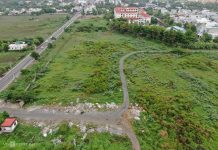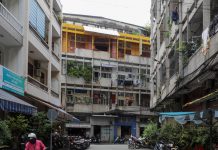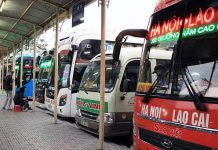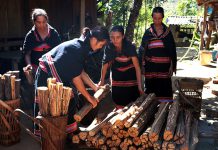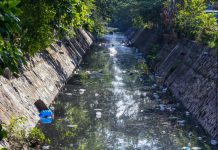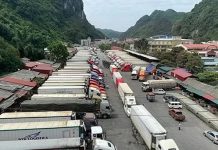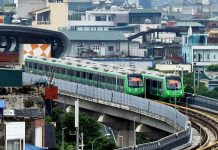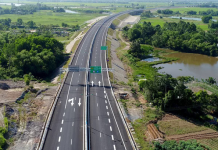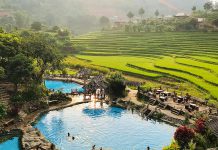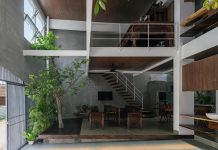The recent commotion surrounding the Panorama hotel in Ha Giang shows the provincial administration’s ineptitude in managing its most precious resources.
 |
Journalist Vu Viet Tuan |
The Panorama hotel and coffee shop was erected on the Ma Pi Leng Pass of Ha Giang, one of the most popular tourism destinations in Vietnam’s northern highlands. But there is no legal document, not even a construction profile, to justify its existence.
The first time I visited Ma Pi Leng was three years ago. On my motorbike, along the winding slopes, I saw towering limestone cliffs, silvery rivers and valleys that spread out as far as the eyes could see. It was an ecstatic, heart-thumping experience.
When I was going down a hill, a group of children sprang out from the side of the road. They were dusty, unkempt; one was carrying her younger sibling, while another wore no pants. They were trying their hardest to snatch whatever was on my motorbike. I revved up my engine, hoping to outrun them, but they just kept chasing until their figures eventually disappeared behind the tree line.
Ha Giang Province is blessed with some of the most spectacular mountain scenes in the country, an idyllic refuge for anyone who craves the quietude and serenity of a life detached from the madness of big cities. But every year, the government still has to transport hundreds of tons of rice for the people of Ha Giang. The children I saw earlier were just pixels in the big picture of the poverty that plagues the region. Ha Giang’s nature, as dazzling as it its, has not done much to propel the economic fortunes of the province’s downtrodden.
This time, I’d come to Ha Giang to figure out why the controversy raging around the hotel. I was also keen on seeing how the region has changed after all these years.
Some of the scenery stayed the same. Houses and huts with dilapidated roofs stood on several mountain slopes. Children with ragged nor no clothes were still to be seen.
But the six-storey hotel stood out like a sore thumb.
 |
The Panorama hotel on Ma Pi Leng pass, Ha Giang Province. Photo by VnExpress/Giang Huy. |
Built on top of the Tu San cliff, the most beautiful location in all of Ma Pi Leng, the hotel came up after Meo Vac District authorities called for investors to build a place where tourists could rest their feet. A year later, the work was done and the hotel opened to the public.
But that’s not how this story ends.
In tears, the hotel’s owner, 57-year-old Vu Thi Anh, told me that the land where the hotel was erected on used to have nothing. There were only rocks and pebbles, where no plant could grow. Since the day the first stone was laid until the day it was completed, she didn’t sleep or eat much.
She said she wanted to bring more tourists to the region so that the people could have a better life. While admitting that she knew the hotel was an unapproved project, “it did not deserve to be either dismantled or shunned.”
People do frequent the hotel. They eat, they drink, the go sightseeing and they take pictures. The hotel’s always filled with laughter, though some patrons are aware it is an illegal enterprise.
As I sat on the highest balcony of the hotel and watched the sun go down behind the Nho Que River and the mountains standing opposite, I felt strangely calm. On the paths leading up to the mountain’s huts, I could see silhouettes carrying large bundles of wood on their backs, swaying side to side as the last light of the day started to fade away from the horizon.
There will be more investors and businesses interested in capitalizing on the beauty that Ha Giang’s been gifted with. If it wasn’t Vu Thi Anh, it would have been someone else who built a different hotel or establishment somewhere in Ma Pi Leng.
Anh’s hotel is not solely born out of her aspiration and resoluteness. It is also a product of its time, of the tourism market’s potential to grow and meet the needs of more and more travelers satisfying their wanderlust.
Whenever one reads socioeconomic reports about Ha Giang and Meo Vac, they would most certainly think there was little the region could do to improve itself, save for farming. But the hotel on the Ma Pi Leng pass, though illegal, was not a minor investment. It is proof that there is more to Meo Vac than the picture painted by the reports; that the district can grow financially and economically through tourism.
But how did it come to this? Local authorities have not figured out a way to deal with either the illegal hotel or the public criticism, while travelers and nature lovers feel betrayed knowing that the area’s natural state has forever been altered. Vu Thi Anh might end up losing everything she has poured into the hotel’s construction.
Panorama’s story is not simply its own. It tells us that the best things this poverty-stricken land offers is poorly utilized and made useless. It tells us that local authorities don’t care enough for such things, and even worse, have no vision or strategy to grow the region’s economy.
The head of the provincial Department of Transport has said that one of the factors behind the illegal hotel is that the province has no detailed development plan, because it has no budget to draw one up. And if this situation persists, there will be more Panoramas illegally erected along Ma Pi Leng at some point in the future.
There’s no definite, easy answer when it comes to dealing with Panorama. Should it be dismantled, fined or simply let be? An unapproved hotel that did not go through any legal process or safety checks, if left be, would signal a breakdown of law and order and create a bad precedent. If it is dismantled, it would be a huge waste of the time, effort and money spent on building it.
If Meo Vac and Ha Giang authorities had considered construction requirements in the area, Panorama could have been built in a different location without violating the law. It could have been an environmentally-friendly structure that easily blends with Ha Giang’s natural beauty instead of an odd, aberrant block of cement standing ungainly amidst the province’s mountains and valleys. I wonder what exactly do Meo Vac officials talk about in meetings to develop the district’s economy if not about proper directions and methods to utilize investors and their capital to develop the region.
At the end of the day, no one and nothing should be above the law. The hotel might very likely have to go. But I’m afraid Panorama’s fate would not be the last of its kind. As long as there’s no strategy or planning for development, any project can easily go down the drain in Meo Vac or Ha Giang. As long as authorities stay ignorant and clueless, disaster awaits.
[Editor’s note: The Panorama hotel, situated on the Ma Pi Leng Pass, Meo Vac District of the northern Ha Giang Province, has been in the news after it was revealed that it had no construction approval and negatively affected its surroundings.
The hotel was also built on top of a land plot reserved for agriculture, which has not been converted for non-agricultural purposes yet.
It might be partially dismantled in the future, Ha Giang officials said.]
*Vu Viet Tuan is a journalist based in Hanoi. The opinions expressed are his own.



